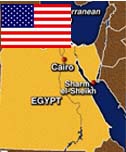In Cairo, US Mideast envoy to be met by skepticism
 Cairo - Egyptians from across the political spectrum say they are greeting news of US special envoy to the Middle East George Mitchell's planned arrival in Cairo on Tuesday evening with a mixture of skepticism and surprise.
Cairo - Egyptians from across the political spectrum say they are greeting news of US special envoy to the Middle East George Mitchell's planned arrival in Cairo on Tuesday evening with a mixture of skepticism and surprise.
Few here or indeed across the Arab world expected US President Barack Obama to make the Israeli-Palestinian conflict one of his first foreign policy priorities. But fewer still expect any real change in US policy on the issue.
"Mitchell does not represent anything new," Hamdeen Sabbahi, a member of the Egyptian parliament and the leader of the unlicensed al-Karama (Dignity) Party, told Deutsche Presse-Agentur dpa. "Nor has Obama said anything new regarding the Palestinian issue."
"Obama was silent on the humanitarian crisis in Gaza. He did not mention the Palestinian people's right to self-determination, and he did not condemn the attacks," Sabbahi said.
"Instead, he called for Hamas to stop firing rockets. Obama won't be as politically corrupt as Bush, but he also won't be any better than previous American presidents."
Mohammed Habib, deputy supreme guide of the banned Muslim Brotherhood, Egypt's largest opposition group, told dpa he suspected Mitchell had been chosen "because of his cleverness in dealing with the problems in Northern Ireland during the Clinton years."
"I think we will see a change in US policy toward Iraq and Iran, but not on the Palestinian file," Habib said. "The (US) Democratic Party has always showed great bias towards the Zionist enemy."
Sources closer to the government said Hamas' relationship with Syria would complicate Mitchell's efforts to negotiate a settlement between the Palestinian group and Israel.
"Mitchell will face great obstacles when he handles the Arab- Israeli conflict," retired general Hossam Suwalam, former head of the Egyptian army's Center for Strategic Studies, told dpa.
"Hamas does not freely control its destiny. He will be negotiating with a party that is restrained by the interests of Syria, which hosts Hamas and Iran, and which gives Hamas 45 million dollars every month. Also, no one wants to deal with Hamas directly, since it is not an official authority," Suwalam said.
Gamal Sultan, an analyst at Cairo's semi-official al-Ahram Centre for Strategic Studies, noted dryly some positives about the Mitchell visit: "At least, Mitchell will not be as biased towards Israel as Dennis Ross (former US envoy under presidents George HW Bush and Bill Clinton) was.
"That he has Arab roots bodes well," Sultan said, referring to Mitchell's mother, a Lebanese Christian who came to the United States in 1920.
Issandr el-Amrani, Egypt and North Africa Analyst for the Brussels-based International Crisis Group, told dpa that he thought "the recent US-Israeli agreement on smuggling into Rafah will make it more difficult to get out of doing anything significant on the Gaza- Egypt border."
The January 17 agreement makes special note "of the efforts of Egyptian President Mubarak, particularly the recognition that securing Gaza's border is indispensable to realizing a durable and sustainable end to fighting in Gaza," and calls for "enhanced US security and intelligence cooperation with regional governments on actions to prevent weapons and explosives flows to Gaza that originate in or transit their territories."
"Egypt may be concerned that the tunnels are a two-way street, that weapons aren't flowing only into Gaza, but also out of Gaza into Egypt, which could be of special concern given Hamas' ties with the Muslim Brotherhood," El-Amrani told dpa.
"But it would be difficult for Egypt to build a 10-metre canal along the Gaza-Egypt border, as some Israeli security officials have suggested," he added.
Egyptian Foreign Minister Ahmed Aboul Gheit, speaking from Brussels, where he attended a meeting of EU foreign ministers on Sunday, said that most of the weapons smuggled into Gaza come by sea, not across the Egypt's border with Gaza.
Egypt has rejected the idea of international soldiers on its soil or international navies in its waters to help prevent smuggling.
In 2005, Egypt sent 750 soldiers to its Gaza border to stop weapons smuggling into the coastal enclave. Egyptian diplomats have said the troops were not enough, given that not all of them can be on duty.
In 2007, according to Israeli media at the time, US assistant secretary of state for political-military affairs Mark Kimmitt and his deputy, Robert Danin, proposed amending the Camp David Accords to allow Egypt to increase its troop presence on the border.
"But this makes some in Israel, who believe that Egypt is the most significant long-term threat to the Jewish state, uneasy," El-Amrani told dpa. "Negotiations on one aspect of Camp David could open the door to negotiations on other aspects of the treaty." dpa